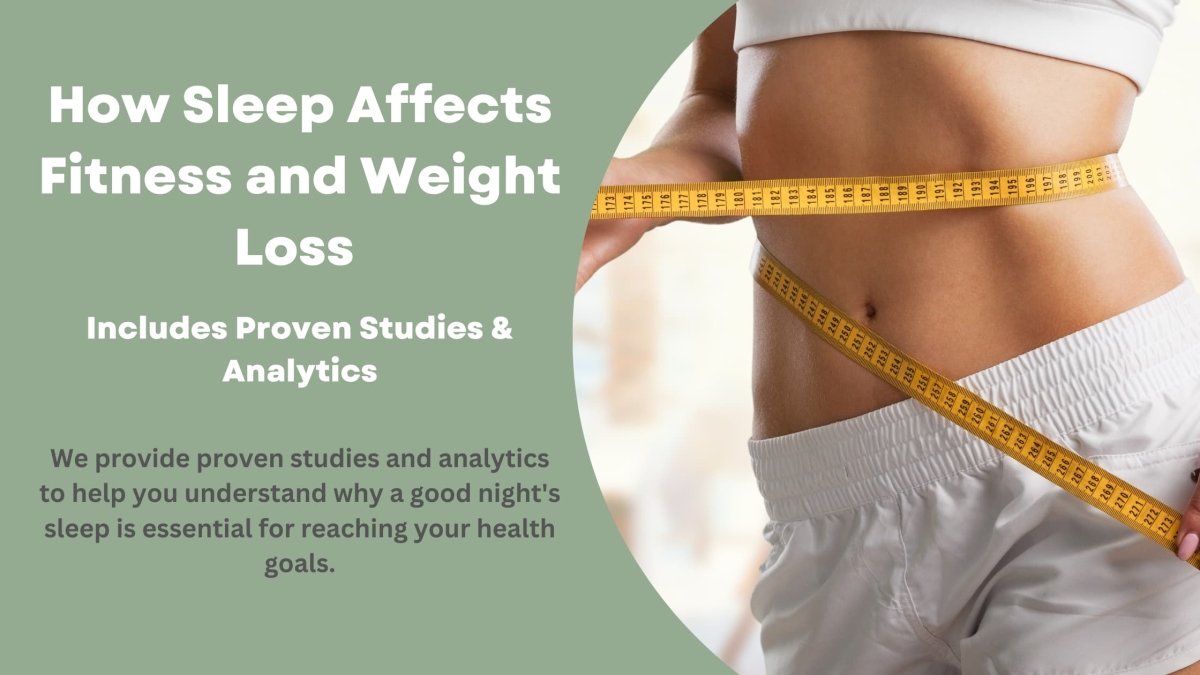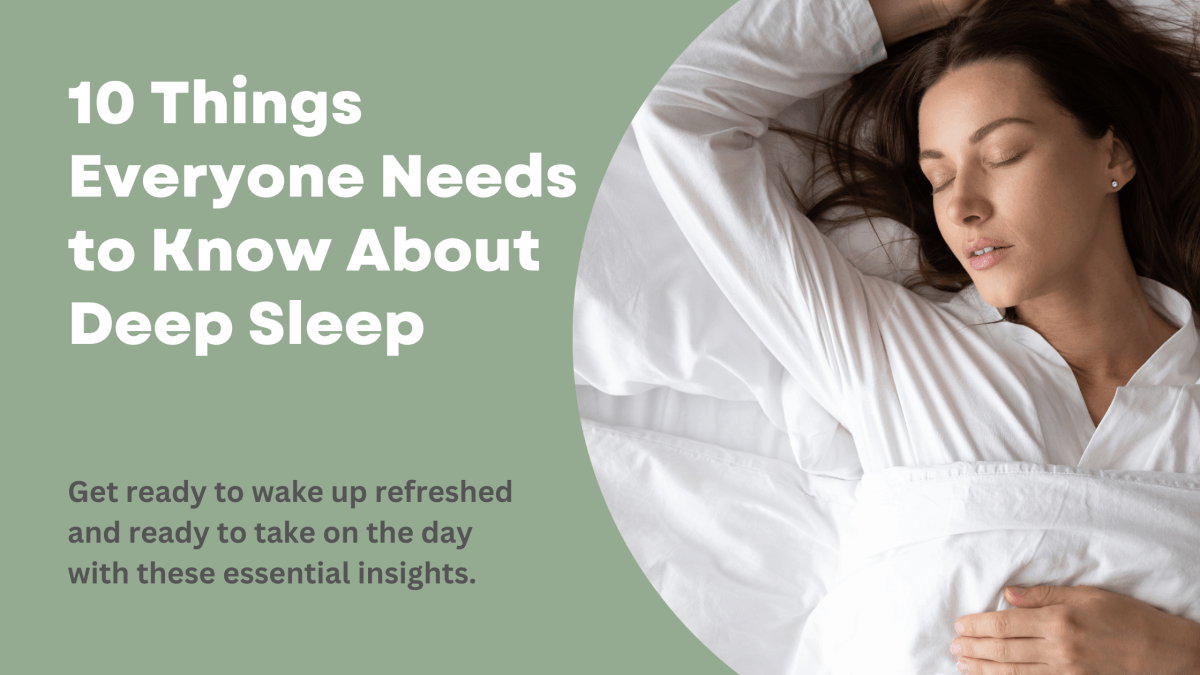How Sleep Affects Fitness and Weight Loss (Includes Proven Studies & Analytics )

There's no denying the vital connection between a good night's sleep and fitness.
You love the blissful feeling that comes from waking up after a perfect night's rest.
The day gets off to a great start, you have energy to spare, and you're ready to conquer the world.
Have you ever wondered if you can lose weight while sleeping?
There's strong evidence to support a sleep and weight loss relationship, but it's not as simple as snuggling down and shedding several pounds before the sun comes up. Studies show that more than 30 percent of adults deal with sleep deprivation, and that has a serious impact on overall fitness, good health and even your weight.
If you wonder about how to lose belly fat and improve your metabolism, we can help you better understand the important links between sleep and weight loss.
The Underlying Causes of Sleep Deprivation

Almost everyone has trouble sleeping occasionally. The neighbor's barking dog or a late-night storm can keep you from enjoying peaceful slumber. You might be worried about work or excited about upcoming plans. Eventually, things settle down, and you manage to drift off again.
Sleep deprivation is a much more serious problem. Most adults need to sleep soundly for an average of seven to nine hours every night. A healthy metabolism depends on a balance of hormones and sleep that restores body and mind through natural circadian rhythms.
Some of the most common causes of sleep deprivation include:
• Constant worry and anxiety.
• Irregular schedules that affect sleeping habits.
• Medical conditions like sleep apnea.
• Temporary illnesses like the flu or a cold.
• Medications containing stimulants.
Over time, you can control most of the problems that lead to insomnia, but other issues that can cause sleep deprivation aren't as obvious. For example, if you sleep on a mattress that retains body heat, you might toss and turn through the night. When you wake up exhausted the next morning, you don't fully understand why you're so fatigued.
Read: 10 Reasons Why the Natures Novel Is the Best Latex Mattress of 2018
Losing a few nights' sleep leaves you feeling worn out, but sleep deprivation can result in long-term health problems. Let's take a closer look at the correlation between sleep and fitness.
Sleep Loss and Related Health Issues

According to the National Institutes of Health , we feel our best when we get at least seven to nine hours of sleep every night. It's tempting to think taking naps or getting up late on weekends makes up for sleep deficits, but that's not the case. Consider these three sleep-related health issues.
1. Overall Physical Fitness - Sleep deprivation can impact your health in simple ways that have long-lasting, negative effects. For example, you usually take the stairs at work as a part of your strategy to stay in shape. When you're tired after a bad night's sleep, it's easier to take the elevator. That's not a good choice for cardio-vascular health.
2. Your Sense of Well-Being - There are psychological issues related to sleep loss too. You don't perform as well on the job when you're worn out, and that becomes frustrating. After awhile, frustration turns into depression. It affects your work and relationships with those around you. Long-term sleep deprivation leaves you feeling constantly stressed, anxious and moody.
3. Hormone Imbalance and Sleep Disorders - The relationship between hormones and sleep is an important factor in maintaining good health. Sleep loss interferes with the production of these essential chemicals and the performance of your endocrine system. The results are fatigue, appetite changes, digestive issues and even low libido that can all be attributed to sleep deprivation.
How a Lack of Sleep Affects Hormones and Weight Gain

While you don't actually gain or lose weight while you sleep, the quality of your rest can have a direct effect on hormonal activity and lead to putting on extra pounds. A good night's sleep gives you the energy you need to take on a busy day. When you're deprived of that necessary boost, your body has to compensate.
After a rough night's sleep, the hormones that regulate appetite react to your low energy level. You probably don't connect being tired with being hungry, but it's often your body's natural hormonal response to sleep loss.
A lack of sleep also has a negative effect on the body's fat cells. Studies indicate that sleep deprivation compromises the way fat cells interact with insulin. This vital hormone normally regulates fat cell energy use and storage, but repeated sleep disruptions upset the process, increase your appetite and eventually lead to metabolic disease.
Over time, a lack of quality sleep can seriously upset your body's hormonal balance and result in weight gain issues including type 2 diabetes, high blood pressure, strokes and obesity.
Natural Weight Loss While Sleeping
The connection between hormone imbalance and weight loss makes it clear that a good night's sleep is essential to overall fitness and good health. However, be very cautious of products that promise to help you lose weight while sleeping. They seldom back up their claims with solid science or reputable medical endorsements.
You might be surprised to learn that there are natural ways to increase fitness and burn fat while sleeping. Simple DIY tricks don't take off the pounds like regular exercise and disciplined dieting, but they can put you on the positive side of healthy living strategies. These are just a few examples.

1. Enjoy three or four cups of green tea throughout the day. The beverage increases metabolic activity that burns calories, and the effect lasts through the night.
2. Treat yourself to a goodnight milk shake. While you sleep, your body processes the milk's whey and casein proteins stimulating your metabolism and burning fat cells.
3. Have a bowl of cottage cheese. This healthy bedtime snack is easy to digest, contains high levels of casein protein and serves up guilt-free, low-calorie goodness.
It's important to note that tricks for burning fat while you sleep can't offset the negative consequences of hormone imbalance and weight loss caused by sleep deprivation. The best way to counteract the nocturnal connection between hormones and weight gain is to get the best night's sleep possible.
The Benefits of Sleeping Well
We've outlined the health issues associated with hormone imbalances resulting from sleep loss, so let's focus on the benefits of a great night's sleep. You know how much easier it is to get through the day after you've slept well. Deep, comfortable sleep restores both body and mind in so many ways.
• A full night's rest promotes a healthy metabolism, and that reduces the risk of heart disease.
• A good night's sleep keeps you mentally sharp, improves your ability to learn and combats depression.
• You don't worry about health problems like hormonal imbalances or how to lose belly fat.
• Consistent, quality sleep results in overall improved physical fitness and helps with weight loss.
When you spend the night in tranquil slumber, your body and brain are better prepared to handle whatever might be in store the next day. From increased creativity to an improved sense of well-being, the benefits of sleeping well make positive differences that last a lifetime.
Ensuring Your Best Night's Sleep

So, how can you avoid the mental and physical health issues caused by sleep deprivation? What can you do to make sure you enjoy all the benefits of a peaceful night including restorative sleep and weight loss?
As leaders among national sleep consultants, we're often asked both questions. We know from experience and customer feedback that four simple strategies can make a real difference in how well you sleep at night.
1. Limit your caffeine and alcohol intake. Both are stimulants that affect your central nervous system, and too much of either can make it hard to drift off to sleep.
2. Turn down the thermostat. As you enter deep sleep, your body's temperature drops, so a cool room creates a more sleep-friendly environment.
3. Turn off electronic devices. Give your brain a break from online stimulation and electronic blue light at least an hour before going to bed.
4. Turn on a little white noise. Running a small fan or a device designed to generate white noise filters out ambient sounds that can keep you awake.
Your Bed and Long-Term Fitness
If you follow our recommendations for sleeping better and you still toss and turn, the problem might be your bed. It's never a good idea to ignore a sleeping environment that's less than ideal. A lumpy mattress or one that doesn't support you correctly can easily lead to long-term sleep deprivation.
Older beds tend to become less comfortable with age, so you might consider upgrading to a model that accommodates your personal sleeping style. Whether you're a side sleeper or rest easier on your back, a new, well-designed mattress can make a wonderful difference in how well you feel when you wake up each morning.
The right mattress for your body type can't help you lose weight while you sleep, but it can improve how well you burn fat while sleeping and minimize the risk of health issues caused by hormone imbalance and sleep disorders. Your life-long fitness and good health depend on a good night's sleep, and that depends on sleeping on the best bed for you.






